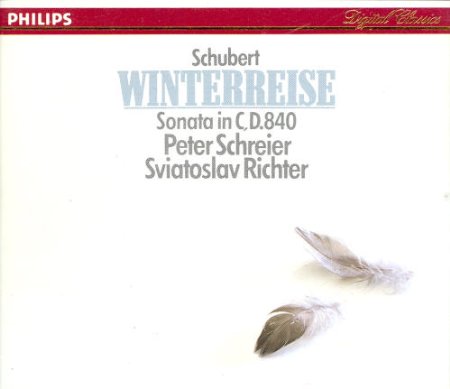Schubert Winterreise
View record and artist detailsRecord and Artist Details
Composer or Director: Franz Schubert
Genre:
Vocal
Magazine Review Date: 2/1986
Media Format: CD or Download
Media Runtime: 0
Mastering:
DDD
Catalogue Number: 416 289-2PH2

Tracks:
| Composition | Artist Credit |
|---|---|
| Winterreise |
Franz Schubert, Composer
Franz Schubert, Composer Peter Schreier, Tenor Sviatoslav Richter, Piano |
| Sonata for Piano No. 15, 'Relique' |
Franz Schubert, Composer
Franz Schubert, Composer Sviatoslav Richter, Piano |
Author: Alan Blyth
I had great expectations of this issue, and on the whole they have been amply fulfilled. As one might expect the performance is highly individual, two very special interpreters giving us a totally gripping, positive account of a cycle that has recently received some rather too careful readings. Schreier and Richter conceive the work in almost a solid span of concentration and that is how it should be, helped by being caught at a live performance.
Perhaps under Richter's influence, tempos are inclined to be extreme, the first song, ''Einsamkeit'', and ''Wegweiser'', for instance, being taken more slowly than usual, ''Die Krahe'' and ''Letzte Hoffnung'', among others, rather quicker—indeed, these two form part of a group, songs 15 to 19, that these artists present as a single utterance. Then both are intent on a linear approach, the tenor taking many phrases in a single breath that other singers are inclined to break. But, paradoxically, Schrier can at the same time add a kind of emotional force to such phrases as ''meiner Liebsten Haus'' in ''Wasserflut'' or ''So elend nicht'' in ''Einsamkeit'' that give them a very particular and literally outstanding intensity. Throughout one is aware of the vivid immediacy and broad romantic freedom of this reading. It won't please those who seek a more restrained, perhaps more authentic version. They can look to Haefliger (Claves) and his fortepiano, or to the classically-minded Wilson-Johnson (Hyperion), but those who appreciate Fischer-Dieskau (on an HMV set of the song-cycles—SLS840, 2/76), but aren't entirely enamoured of the occasional bulge in his tone or forcing of it, will want to try Schreier, particularly when he has an accompanist who can so magisterially evoke the many onomatopoeic effects in the piano parts, or make one look at a figure anew through the clarity of his articulation.
This issue arrived too late in the time allotted for reviewing this month to savour all its many subtleties, yet I am certain it is going to be an interpretation of lasting value to be enjoyed at leisure. But it has one major drawback that may be even more obvious on CD (which, incidentally, is coupled with the Sonata, D840 reviewed on page 1050): the cold February weather in Dresden causes the audience to cough incessantly, and too often at pregnant pauses, so that anyone who is worried by that will have to remain with Fischer-Dieskau and Moore. I am willing to put up with the disturbance for the pleasure of being, as it were, present on such a memorable occasion.'
Perhaps under Richter's influence, tempos are inclined to be extreme, the first song, ''Einsamkeit'', and ''Wegweiser'', for instance, being taken more slowly than usual, ''Die Krahe'' and ''Letzte Hoffnung'', among others, rather quicker—indeed, these two form part of a group, songs 15 to 19, that these artists present as a single utterance. Then both are intent on a linear approach, the tenor taking many phrases in a single breath that other singers are inclined to break. But, paradoxically, Schrier can at the same time add a kind of emotional force to such phrases as ''meiner Liebsten Haus'' in ''Wasserflut'' or ''So elend nicht'' in ''Einsamkeit'' that give them a very particular and literally outstanding intensity. Throughout one is aware of the vivid immediacy and broad romantic freedom of this reading. It won't please those who seek a more restrained, perhaps more authentic version. They can look to Haefliger (Claves) and his fortepiano, or to the classically-minded Wilson-Johnson (Hyperion), but those who appreciate Fischer-Dieskau (on an HMV set of the song-cycles—SLS840, 2/76), but aren't entirely enamoured of the occasional bulge in his tone or forcing of it, will want to try Schreier, particularly when he has an accompanist who can so magisterially evoke the many onomatopoeic effects in the piano parts, or make one look at a figure anew through the clarity of his articulation.
This issue arrived too late in the time allotted for reviewing this month to savour all its many subtleties, yet I am certain it is going to be an interpretation of lasting value to be enjoyed at leisure. But it has one major drawback that may be even more obvious on CD (which, incidentally, is coupled with the Sonata, D840 reviewed on page 1050): the cold February weather in Dresden causes the audience to cough incessantly, and too often at pregnant pauses, so that anyone who is worried by that will have to remain with Fischer-Dieskau and Moore. I am willing to put up with the disturbance for the pleasure of being, as it were, present on such a memorable occasion.'
Discover the world's largest classical music catalogue with Presto Music.

Gramophone Digital Club
- Digital Edition
- Digital Archive
- Reviews Database
- Full website access
From £8.75 / month
Subscribe
Gramophone Full Club
- Print Edition
- Digital Edition
- Digital Archive
- Reviews Database
- Full website access
From £11.00 / month
Subscribe
If you are a library, university or other organisation that would be interested in an institutional subscription to Gramophone please click here for further information.




